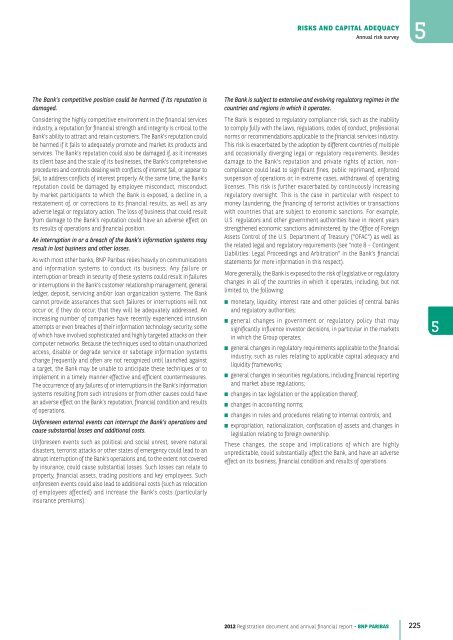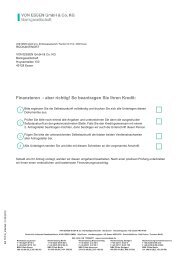2012 Registration document and annual financial report - BNP Paribas
2012 Registration document and annual financial report - BNP Paribas
2012 Registration document and annual financial report - BNP Paribas
- No tags were found...
Create successful ePaper yourself
Turn your PDF publications into a flip-book with our unique Google optimized e-Paper software.
RISKS AND CAPITAL ADEQUACYAnnual risk survey5The Bank’s competitive position could be harmed if its reputation isdamaged.Considering the highly competitive environment in the <strong>financial</strong> servicesindustry, a reputation for <strong>financial</strong> strength <strong>and</strong> integrity is critical to theBank’s ability to attract <strong>and</strong> retain customers. The Bank’s reputation couldbe harmed if it fails to adequately promote <strong>and</strong> market its products <strong>and</strong>services. The Bank’s reputation could also be damaged if, as it increasesits client base <strong>and</strong> the scale of its businesses, the Bank’s comprehensiveprocedures <strong>and</strong> controls dealing with conflicts of interest fail, or appear tofail, to address conflicts of interest properly. At the same time, the Bank’sreputation could be damaged by employee misconduct, misconductby market participants to which the Bank is exposed, a decline in, arestatement of, or corrections to its <strong>financial</strong> results, as well as anyadverse legal or regulatory action. The loss of business that could resultfrom damage to the Bank’s reputation could have an adverse effect onits results of operations <strong>and</strong> <strong>financial</strong> position.An interruption in or a breach of the Bank’s information systems mayresult in lost business <strong>and</strong> other losses.As with most other banks, <strong>BNP</strong> <strong>Paribas</strong> relies heavily on communications<strong>and</strong> information systems to conduct its business. Any failure orinterruption or breach in security of these systems could result in failuresor interruptions in the Bank’s customer relationship management, generalledger, deposit, servicing <strong>and</strong>/or loan organization systems. The Bankcannot provide assurances that such failures or interruptions will notoccur or, if they do occur, that they will be adequately addressed. Anincreasing number of companies have recently experienced intrusionattempts or even breaches of their information technology security, someof which have involved sophisticated <strong>and</strong> highly targeted attacks on theircomputer networks. Because the techniques used to obtain unauthorizedaccess, disable or degrade service or sabotage information systemschange frequently <strong>and</strong> often are not recognized until launched againsta target, the Bank may be unable to anticipate these techniques or toimplement in a timely manner effective <strong>and</strong> efficient countermeasures.The occurrence of any failures of or interruptions in the Bank’s informationsystems resulting from such intrusions or from other causes could havean adverse effect on the Bank’s reputation, <strong>financial</strong> condition <strong>and</strong> resultsof operations.Unforeseen external events can interrupt the Bank’s operations <strong>and</strong>cause substantial losses <strong>and</strong> additional costs.Unforeseen events such as political <strong>and</strong> social unrest, severe naturaldisasters, terrorist attacks or other states of emergency could lead to anabrupt interruption of the Bank’s operations <strong>and</strong>, to the extent not coveredby insurance, could cause substantial losses. Such losses can relate toproperty, <strong>financial</strong> assets, trading positions <strong>and</strong> key employees. Suchunforeseen events could also lead to additional costs (such as relocationof employees affected) <strong>and</strong> increase the Bank’s costs (particularlyinsurance premiums).The Bank is subject to extensive <strong>and</strong> evolving regulatory regimes in thecountries <strong>and</strong> regions in which it operates.The Bank is exposed to regulatory compliance risk, such as the inabilityto comply fully with the laws, regulations, codes of conduct, professionalnorms or recommendations applicable to the <strong>financial</strong> services industry.This risk is exacerbated by the adoption by different countries of multiple<strong>and</strong> occasionally diverging legal or regulatory requirements. Besidesdamage to the Bank’s reputation <strong>and</strong> private rights of action, noncompliancecould lead to significant fines, public reprim<strong>and</strong>, enforcedsuspension of operations or, in extreme cases, withdrawal of operatinglicenses. This risk is further exacerbated by continuously increasingregulatory oversight. This is the case in particular with respect tomoney laundering, the financing of terrorist activities or transactionswith countries that are subject to economic sanctions. For example,U.S. regulators <strong>and</strong> other government authorities have in recent yearsstrengthened economic sanctions administered by the Office of ForeignAssets Control of the U.S. Department of Treasury (“OFAC”) as well asthe related legal <strong>and</strong> regulatory requirements (see “note 8 – ContingentLiabilities: Legal Proceedings <strong>and</strong> Arbitration” in the Bank’s <strong>financial</strong>statements for more information in this respect).More generally, the Bank is exposed to the risk of legislative or regulatorychanges in all of the countries in which it operates, including, but notlimited to, the following:■ monetary, liquidity, interest rate <strong>and</strong> other policies of central banks<strong>and</strong> regulatory authorities;■ general changes in government or regulatory policy that maysignificantly influence investor decisions, in particular in the marketsin which the Group operates;■ general changes in regulatory requirements applicable to the <strong>financial</strong>industry, such as rules relating to applicable capital adequacy <strong>and</strong>liquidity frameworks;■ general changes in securities regulations, including <strong>financial</strong> <strong>report</strong>ing<strong>and</strong> market abuse regulations;■ changes in tax legislation or the application thereof;■ changes in accounting norms;■ changes in rules <strong>and</strong> procedures relating to internal controls; <strong>and</strong>■ expropriation, nationalization, confiscation of assets <strong>and</strong> changes inlegislation relating to foreign ownership.These changes, the scope <strong>and</strong> implications of which are highlyunpredictable, could substantially affect the Bank, <strong>and</strong> have an adverseeffect on its business, <strong>financial</strong> condition <strong>and</strong> results of operations.5<strong>2012</strong> <strong>Registration</strong> <strong>document</strong> <strong>and</strong> <strong>annual</strong> <strong>financial</strong> <strong>report</strong> - <strong>BNP</strong> PARIBAS 225





